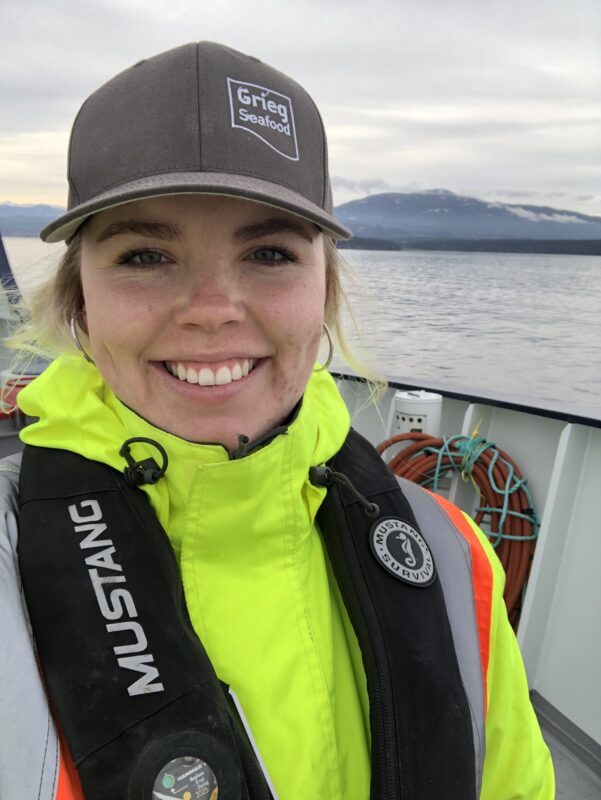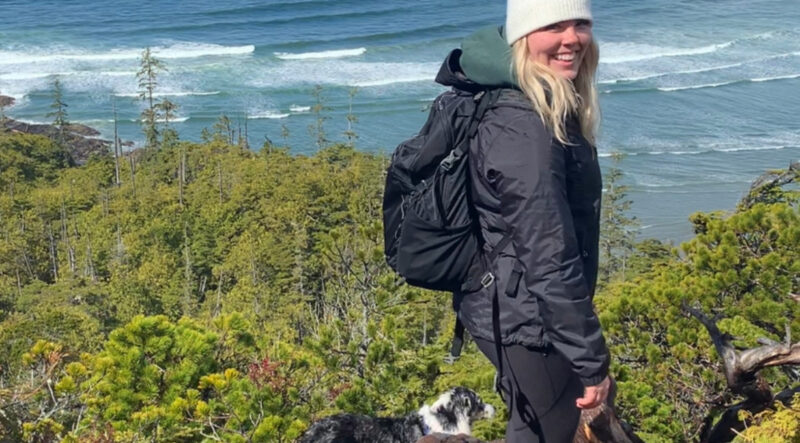THIS IS SALMON FARMING with KIRSTYN HALLBERG
The passion I see in these people is nothing I have experienced before. Salmon farmers are people who live in nature, they love nature, and the last thing they want is to harm nature.
Aquaculture is responsible for thousands of high-paid, skilled, and rewarding jobs across British Columbia. As the demand for sustainable and affordable farmed salmon grows worldwide, there is a fit for virtually any career path in this industry. In the seventh and final of our Q&A series with young professionals in BC’s salmon farming sector, we speak with Kirstyn Hallberg, Environmental Specialist, Grieg Seafood BC Ltd.
Tell us a bit about yourself?
I was born and raised on Vancouver Island, BC. I went to the University of Victoria and received a Bachelor of Science in Marine Biology and Oceanography. I moved to Campbell River in 2019 for work and have been enjoying every moment since.
What do you appreciate about living in Campbell River?
I really appreciate how many things there is to do here. There are not too many places where you can spend a morning up on a snow-capped mountain and come down for a swim in the ocean after.
What are two opportunities you come across as a young salmon farmer in British Columbia?
I think the biggest opportunity that young salmon farmers come across is their resiliency. We are a passionate, hardworking group of smart individuals. Many things are thrown our way and it has helped everyone grow. This industry has also provided me with incredible opportunities to work with new pieces of equipment, emerging companies, and advancing technologies. I am grateful every day for the opportunities to try new things, to improve on what we are doing, and learn along the way.
And what are two challenges you encounter as a young salmon farmer in British Columbia?
I think the largest challenge we face is the uncertainty of this sector. Young, educated professionals in the early stages of their career are looking to build. Build themselves professionally, build their financials, set down roots, build families, eventually buy houses, etc. All these things are difficult to do when your industry is so on edge and feels like it can be pulled away at any moment.
Another challenge we face is the constant spread of false information. Quite often the people that are spreading false information are unwilling to have an open, honest discussion and resort to harsh methods such as name calling which is quite frankly just childish. Not only is it time consuming, but it is so exhausting.
What are some of those misconceptions or misunderstandings some people have about salmon farming, and how do you educate the public about it?
I have an incredible amount of frustration about all the misconceptions, but one that personally bothers me is when I hear people say that “salmon farmers hate wild salmon”, “salmon farmers don’t care about natural environments” or anything similar. That one personally bothers because salmon farmers are by far the most caring industry. The passion I see in these people is nothing I have experienced before. Salmon farmers are people who live in nature, they love nature, and the last thing they want is to harm nature.
Could you share two insights into the sustainable practices and environmental considerations that are important in salmon farming?
Given my position within Grieg, environmental considerations are at the forefront of what I do. My position is quite literally to monitor the environment in which we farm, and make sure that conditions always are favourable. Every aspect of salmon farming is a carefully planned thought, and there are people working on all sides to ensure not only the health of our fish, but the health of the areas in which we farm.
How do, or would, you balance the economic aspects of salmon farming with the need for environmental stewardship and conservation?
I think salmon farming is already in a leading position where the environmental footprint is significantly smaller than any other food production industry. This provides us a unique opportunity to try new strategies and see how many improvements upon systems we can make. For example, we do have the lowest carbon footprint of any food production sector but let’s not stop there and let’s see how we can improve our fuel efficiency and improve even further. Continuous developments and improvements are what makes this industry so special. There is no line of “good enough” but always “how can we improve”.
What types of technological advancements or innovations have you seen in salmon farming since you’ve been in the industry, and how has it influenced your work?
One of my favorite things about this industry is the fact that it is evolving at such a rapid rate. The industry already looks different than when I started in 2019. One very cool technology-related innovation project that I have been working closely on is the integration of wireless, real-time sensors at all the farms, which feed into our online environmental dashboard. The dashboard can use this real-time data to create forecasts of environmental conditions. Having advancements like this helps farmers make informed, game-time decisions with the best interest of the fish in mind.
Do you have any other notable success stories or achievements in your salmon farming career thus far to share with us?
I have been extremely fortunate in my career this far, to have been given opportunities to share insights into our industry and achievements and projects we are working on. For example, last fall I was lucky enough to travel to Santiago, Chile, to present at the International Symposium for Aquatic Animal Health and share the environmental data collection and forecasting models that we are using as a management strategy for unfavourable environmental conditions. Having the opportunity to spotlight our environmental monitoring measures and use of new and emerging technologies was incredible.
Favourite things to do when not working?
In my spare time you can catch me camping, hiking, or in my kitchen cooking and baking. I am proud to say that over COVID I perfected my sourdough bread!
Do you have a favourite place you go to for salmon sushi? Or , do you have a salmon recipe you would like to share with us?
My favourite go-to place for salmon sushi in Campbell River is Takao’s Sushi. Which is conveniently located across the street from our office. It’s my favourite lunch spot.
When I am at home, my favorite salmon recipe is to sprinkle Montreal steak spice on a filet, and cover with slices of fresh lemon. Bake or BBQ to cook. It’s a quick, easy meal that is so flavourful!


